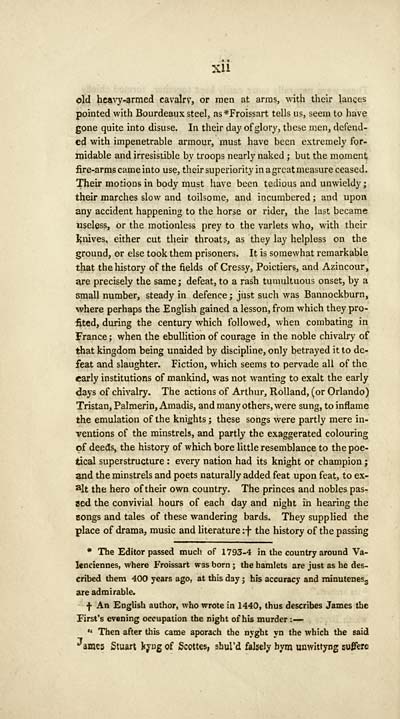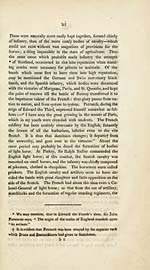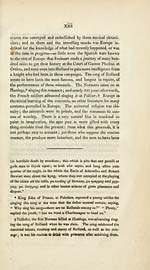Genealogy of the family of Forbes
(20) Page xii
Download files
Complete book:
Individual page:
Thumbnail gallery: Grid view | List view

xii
old heavy-armed cavalrv, or men at arms, with their lances
pointed with Bourdeaux steel, as*Froissart tells us, seem to have
gone quite into disuse. In their day of glory, these men, defend-
ed with impenetrable armour, must have been extremely for-
Kiidable and irresistible by troops nearly naked ; but the moment
fire-arms came into use, their superiority in a great measure ceased.
Their motions in body must have been tedious and unwieldy ;
their marches slow and toilsome, and incumbered ; and upon
any accident happening to the horse or rider, the last became
useless, or the motionless prey to the varlets who, with their
Ifnives, either cut their throats, as they lay helpless on the
ground, or else took them prisoners. It is somewhat remarkable
that the liistory of the fields of Cressy, Poictiers, and Azincour,
are precisely the same ; defeat, to a rash tumultuous onset, by a
small number, steady in defence ; just such was Bannockburn,
where perhaps the English gained a lesson, from which they pro-
iited, during the century which followed, when combating in
France ; when the ebullition of courage in the noble chivalry of
that kingdom being unaided by discipline, only betrayed it to de-
feat and slaughter. Fiction, which seems to pervade all of the
early institutions of mankind, was not wanting to exalt the early
days of chivalry. The actions of Arthur, Holland, (or Orlando)
Tristan, Palraerin, Amadis, and many others, were sung, to inflame
the emulation of the knights ; these songs were partly mere in-
ventions of the minstrels, and partly the exaggerated colouring
of deeds, the history of which bore little resemblance to the poe-
tical superstructure : every nation had its knight or champion ;
and the minstrels and poets naturally added feat upon feat, to ex-
^It the hero of their own country. The princes and nobles pas-
sed the convivial hours of each day and night in hearing the
songs and tales of these wandering bards. They supplied the
place of drama, music and hterature :f the history of the passing
• The Editor passed much of 1793-4 in the country around Va-
lenciennes, where Froissart was born ; the hamlets are just as he des-
cribed them 400 years ago, at this day ; his accuracy and minutenesg
are admirable.
•)■ An English author, who wrote in 1440, thus describes James the
First's evening occupation the night of his murder :—
" Then after this came aporach the nyght yn the which the said
''aines Stuart kyng of Scottes, sbul'd falsely bym unwittyng suffere
old heavy-armed cavalrv, or men at arms, with their lances
pointed with Bourdeaux steel, as*Froissart tells us, seem to have
gone quite into disuse. In their day of glory, these men, defend-
ed with impenetrable armour, must have been extremely for-
Kiidable and irresistible by troops nearly naked ; but the moment
fire-arms came into use, their superiority in a great measure ceased.
Their motions in body must have been tedious and unwieldy ;
their marches slow and toilsome, and incumbered ; and upon
any accident happening to the horse or rider, the last became
useless, or the motionless prey to the varlets who, with their
Ifnives, either cut their throats, as they lay helpless on the
ground, or else took them prisoners. It is somewhat remarkable
that the liistory of the fields of Cressy, Poictiers, and Azincour,
are precisely the same ; defeat, to a rash tumultuous onset, by a
small number, steady in defence ; just such was Bannockburn,
where perhaps the English gained a lesson, from which they pro-
iited, during the century which followed, when combating in
France ; when the ebullition of courage in the noble chivalry of
that kingdom being unaided by discipline, only betrayed it to de-
feat and slaughter. Fiction, which seems to pervade all of the
early institutions of mankind, was not wanting to exalt the early
days of chivalry. The actions of Arthur, Holland, (or Orlando)
Tristan, Palraerin, Amadis, and many others, were sung, to inflame
the emulation of the knights ; these songs were partly mere in-
ventions of the minstrels, and partly the exaggerated colouring
of deeds, the history of which bore little resemblance to the poe-
tical superstructure : every nation had its knight or champion ;
and the minstrels and poets naturally added feat upon feat, to ex-
^It the hero of their own country. The princes and nobles pas-
sed the convivial hours of each day and night in hearing the
songs and tales of these wandering bards. They supplied the
place of drama, music and hterature :f the history of the passing
• The Editor passed much of 1793-4 in the country around Va-
lenciennes, where Froissart was born ; the hamlets are just as he des-
cribed them 400 years ago, at this day ; his accuracy and minutenesg
are admirable.
•)■ An English author, who wrote in 1440, thus describes James the
First's evening occupation the night of his murder :—
" Then after this came aporach the nyght yn the which the said
''aines Stuart kyng of Scottes, sbul'd falsely bym unwittyng suffere
Set display mode to:
![]() Universal Viewer |
Universal Viewer | ![]() Mirador |
Large image | Transcription
Mirador |
Large image | Transcription
Images and transcriptions on this page, including medium image downloads, may be used under the Creative Commons Attribution 4.0 International Licence unless otherwise stated. ![]()
| Histories of Scottish families > Genealogy of the family of Forbes > (20) Page xii |
|---|
| Permanent URL | https://digital.nls.uk/94949370 |
|---|
| Description | A selection of almost 400 printed items relating to the history of Scottish families, mostly dating from the 19th and early 20th centuries. Includes memoirs, genealogies and clan histories, with a few produced by emigrant families. The earliest family history goes back to AD 916. |
|---|

